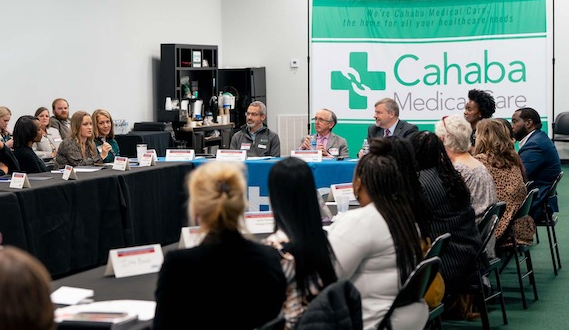Cahaba Medical Care recently hosted a roundtable discussion with leaders from the Health Resources and Services Administration (HRSA) to address maternal health challenges in rural communities. Held on National Rural Health Day, the event underscored the importance of collaborative efforts to improve maternal health outcomes across Alabama. The event, held in Centreville on Nov. 21, coincided with National Rural Health Day and brought together federal and local leaders, healthcare providers, community organizations, and families.
Cahaba Medical Care serves 18 counties across Alabama, including Bibb, Perry, Chilton, Dallas, Hale, Jefferson, Marengo, and Tuscaloosa. These counties, many of which are in rural regions, face significant challenges in healthcare access, particularly in maternal and family health. By bringing HRSA leaders to the table, the organization aimed to spotlight the unique needs of these communities and explore solutions to bridge gaps in care.
HRSA’s Enhancing Maternal Health Initiative tour was the focal point of the discussion, emphasizing the importance of rural healthcare providers like Cahaba Medical Care in combating Alabama’s high maternal mortality rates. The event showcased impactful stories from families and highlighted federal investments aimed at advancing maternal health equity in underserved areas.
During the discussion, participants addressed critical issues such as the high rates of maternal mortality in rural areas, the need for more localized healthcare resources, and the importance of early prenatal care. Cahaba Medical Care shared examples of its initiatives, including mobile healthcare units, expanded prenatal services, and partnerships with local organizations to support expecting mothers. These efforts are designed to improve outcomes for families across the organization’s broad service area.
Dr. Michael Warren, HRSA Associate Administrator, emphasized the importance of collaboration, stating, “This roundtable is a testament to the power of collaboration. By combining federal resources with local expertise, we are creating pathways to better health for mothers and families in Alabama.” The discussion focused on innovative solutions, including expanding access to prenatal care, telehealth services, and behavioral health screenings.
The event also explored Cahaba Medical Care’s innovative programs, such as Centering Pregnancy support groups and telehealth services, aimed at reducing barriers to care. Local hospitals, including Bibb Medical Center and Ascension St. Vincent’s, are key partners in these initiatives. Cahaba Medical Care’s CEO, Dr. John B. Waits, highlighted the organization’s leadership in addressing maternal health disparities. “Cahaba Medical Care is proud to lead efforts in addressing maternal health disparities. This event highlights the importance of listening to families and creating solutions that meet their unique needs,” Dr. Waits said.
The event also featured personal testimonials, such as that of Kearia Martin, a patient at Cahaba Medical Care, who shared, “They all treated me like family. I felt loved, and they always checked on my mental health. They take you in with love, nothing negative. I would do it all over again just to have this experience.”
The roundtable concluded with a renewed commitment from HRSA and Cahaba Medical Care to improve maternal health equity and access. The discussions included scaling programs like Centering Pregnancy support groups and leveraging partnerships with local hospitals.
With 26 locations across central Alabama, Cahaba Medical Care continues to provide comprehensive healthcare services, including maternal care, to some of the state’s most rural and underserved communities. This event showcased the pivotal role of such organizations in addressing the maternal health crisis and fostering long-term health equity.

